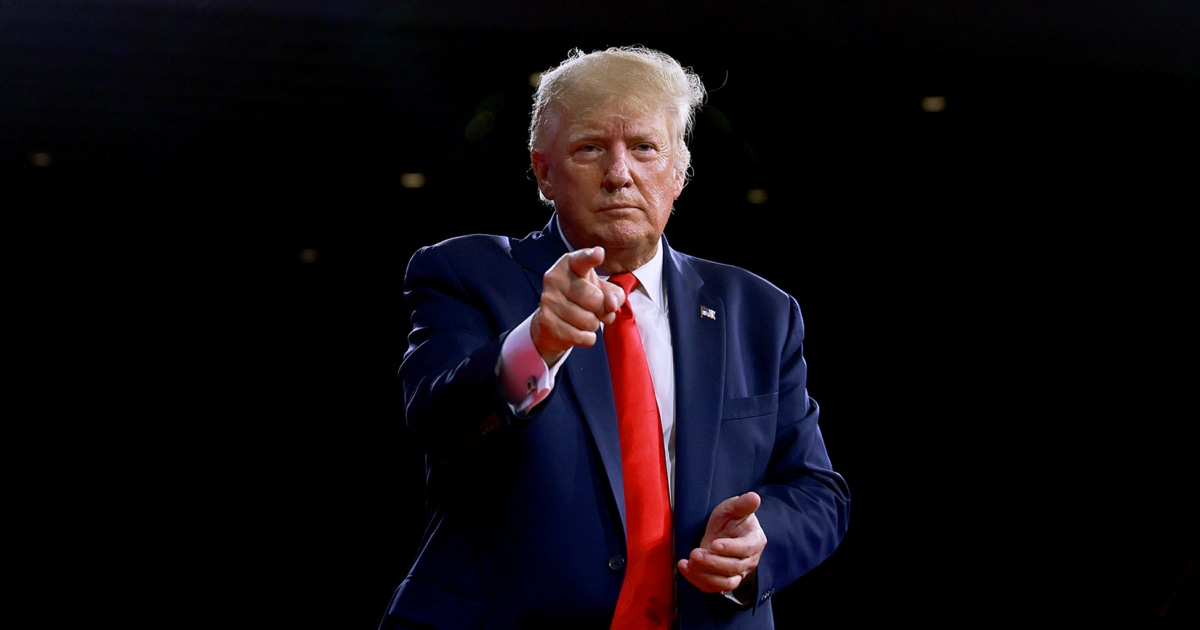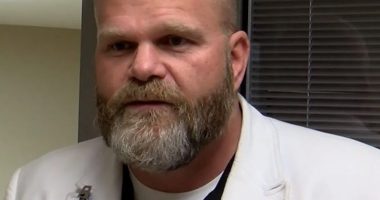
PALM BEACH, Fla. — Donald Trump, the only president impeached twice, plans to seek a return to the Oval Office in 2024, he will say Tuesday, two years after voters ousted him and a week after they rejected his hand-picked candidates in several pivotal Senate races.
His plan was confirmed by a longtime adviser, just hours before he was due to begin speaking from his Mar-a-Lago resort.
Trump is at once the immediate front-runner for the Republican nomination and a diminished force within his party. As results rolled in from last week’s midterm election — with Democrats maintaining control of the Senate and Republicans winning a much smaller-than-expected majority in the House — some Republican elites began publicly clamoring for Trump to step aside for the good of the party.
His “big lie” — that the 2020 election was stolen from him — led to an insurrection at the Capitol Jan. 6, 2021, prompting investigations by the Justice Department and Congress that unfolded in the midst of this year’s midterms.
Despite losing that election by more than seven million votes with no signs of mass fraud, Trump insisted that he had won.
His decision to run again is driven in part by his desire to seek revenge against President Joe Biden, whose victory led Trump into a spiral of advancing false conspiracy theories about his loss. That rage was at the heart of a campaign he and his allies pursued to invalidate the 2020 election results, jeopardizing the nation’s tradition of peaceful transfers of power and culminating in an attack on the Capitol that temporarily delayed the official certification of Biden’s win.
Trump’s claims of vote-tampering were rejected by Republican state election officials, federal judges — including Trump appointees — and independent fact-checkers.
But while his “big lie” didn’t appear to cost him as much among Republican voters, midterm general election voters proved less inclined to the Trump era.
Trump played heavily in Republican primaries this year, but his favored candidates performed poorly: Mehmet Oz in Pennsylvania, Don Bolduc in New Hampshire, Blake Masters in Arizona and Adam Laxalt in Nevada all lost. Herschel Walker, the GOP nominee for Senate in Georgia, placed second and is headed for a run-off against Sen. Raphael Warnock, D-Ga.
So, while Trump has consistently out-polled potential primary rivals and demonstrated unrivaled fundraising prowess, his candidacy will test GOP voters’ ongoing fidelity to a former president who has been the party’s dominant player during three straight disappointing election cycles — the 2018 and 2022 midterms and his own loss in 2020. Many Republicans would like to see Ron DeSantis, who won a second term as governor of Trump’s home state by about 20 points last week, emerge as the party’s nominee in 2024.
“The base in Missouri is caught between the people that believe Trump is the original disruptor and a growing group that believe it’s time for DeSantis,” said Elijah Haahr, a former Republican speaker of the Missouri House. Those who want the party to move on “view Trump as an obsolete Terminator and DeSantis as the T-1000,” while the pro-Trump set see DeSantis as the pale-imitation “new Coke,” he said.
It is unusual, but not unprecedented, for a former president to seek his old office. Herbert Hoover was the last to try — unsuccessfully — in 1940. If Trump were to win in 2024, he would become only the second president, after Grover Cleveland in 1892, to reclaim the job by defeating the man who beat him.
His announcement will complicate the work of Justice Department prosecutors looking into the twice-impeached Trump’s handling of classified documents after leaving office and his role in the Jan. 6 insurrection, when his most ardent supporters stormed the Capitol in an attempt to stop the certification of Joe Biden’s presidency.
The Justice Department traditionally tries to avoid asserting itself in areas that could affect elections — though then-FBI Director James Comey faced criticism over his decision to reopen the investigation into Hillary Clinton’s private email server 11 days before the 2016 election.
Trump now faces a federal criminal investigation for his role in the Jan. 6 riot and a separate criminal probe into whether he illegally took and stored sensitive U.S. government documents at his Mar-a-Lago club in Florida after he was president. Separately, an Atlanta-area local prosecutor is examining whether to bring charges against Trump for allegedly interfering in the 2020 presidential election in Georgia, which he lost.
A rematch
Trump, according to those familiar with his thinking, believes that Biden will be easier to beat in two years because the economy could still have high inflation and the incumbent, who will be nearly 82, will be too frail for voters to support over Trump, who will be 78.
Trump remains deeply unpopular with much of the country. A November NBC News poll showed that 35 percent of registered voters have a positive view of him, while 55 percent have a negative view. By comparison, 44 percent have a positive view of Biden and 50 percent have a negative view.
There are also signs that Trump’s standing inside the GOP has softened: an NBC poll found that most Republicans identify more with the party than with its former leader, 62 percent to 30 percent. In late October 2020, the same measure had Trump up 54 percent to 38 percent on the party, and the two were tied at 46 percent apiece in January 2021.
Since then, the House committee investigating the Jan. 6 attack has revealed, in striking detail, the lengths to which Trump and his team worked to reverse the results of the election. They lobbied state election officials to find votes, pushed state legislatures to appoint alternative slates of electors and ultimately collected signatures from “fake electors” in swing states.
When that didn’t work, the committee said, Trump leaned on then-Vice President Mike Pence, publicly and privately, to reject the certification of real electors and ultimately urged a mob of his backers to march to the Capitol, where they tried to stop the count.
Despite a divisive presidency and approval ratings below the 50 percent mark, Trump’s advisers were confident in early 2020 that he would win re-election. But he suffered from the perception of mismanagement during his biggest test as president: the onset of the Covid-19 pandemic.
Trump responded slowly, often said the virus would vanish on its own, and consistently downplayed its economic and health effects. His push for approval of vaccines, which proved to be one of his most effective initiatives as president, did not come to full fruition until after the 2020 election. And when it did, many of his supporters declined to get vaccinated and challenged the scientific merits of a mass-vaccination campaign.
During his four years as president, Trump often sought to cater to his political base rather than pursuing Democratic and independent voters — or even the moderate Republicans he seemed to relish alienating. He began, but did not finish, construction of a wall along the U.S. border with Mexico, a campaign promise that symbolized his harsh stance against immigration.
That effort was at the center of the longest shutdown in federal government history, a 35-day lockout that ended with Trump first relenting on the wall and then diverting funds appropriated for other purposes to try to build it. Trump, the first president to win office without experience in civilian government or the military, frustrated fellow Republicans early on in that battle by telling Democratic leaders, live on television, that he would take responsibility for a work stoppage.
In four years, Trump had a mixed record on foreign policy. He angered establishment Washington types by demanding that NATO countries invest more of their treasuries in the alliance, but succeeded in getting more contributions. Likewise, his flirtations with dictators such as Russia’s Vladimir Putin and North Korea’s Kim Jong Un rattled American and European capitals. Despite two nuclear summits with Kim — in Singapore and Hanoi — Trump was, as predicted by some in his own administration, unable to win concessions on North Korea’s weapons program.
In his closing days in office, spurred by son-in-law Jared Kushner’s work in the Middle East, Trump oversaw the Abraham Accords, a set of cooperation agreements between Israel and a series of Muslim-majority nations. And his administration conducted the negotiations that led to the U.S. withdrawal from Afghanistan after two decades. But critics argue that his decision to pull the U.S. out of a nuclear deal with Iran strengthened Tehran.
Trump’s relationship with Russia, before and after his 2016 election, was the focus of a special counsel probe and hearings in the Democratic-led House. Trump was not charged with any crimes as a result of the investigation, which he called “a hoax.”
But he was impeached a record two times by the House. The first time, in December 2019, the House took him to task for pressuring Ukrainian President Volodymyr Zelenskyy to announce an investigation into Biden. The second time, in January 2021, Trump was impeached for his role in the Capitol insurrection. In both cases, the Senate failed to reach a two-thirds majority to convict him of the charges.
‘Very probably’
Trump never really left the public eye. Though he was banned from Twitter, he posted messages to the platform Truth Social, held trademark rallies on behalf of his SuperPAC and Republican candidates, and made endorsements in roughly 200 races for federal and state offices during the first two years following his ouster.
While the vast majority of his favored candidates won primaries this year, Trump has been dealt a few embarrassing setbacks — including in his efforts to oust Georgia Gov. Brian Kemp and Georgia Secretary of State Brad Raffensperger, both of whom refused to help him overturn their state’s 2020 election results.
Those mixed results suggest that Trump’s big leads in national polls of the potential 2024 GOP primary field could wane if he draws a strong competitor. So do some of the surveys of key primary battlegrounds.
A recent poll of Georgia voters from the Republican firm Echelon Insights found Trump losing a hypothetical primary to Florida Gov. Ron DeSantis, 52-36 percent. Some Florida polls have also shown DeSantis leading Trump in a one-on-one race. One survey in the nation’s first primary state, New Hampshire, showed the two statistically tied, but another survey show Trump with a lead.
In mid-October, his Save America PAC had nearly $70 million in its treasury. Trump’s candidacy will trigger limits on how his campaign interacts with his PAC, but the money can be used to promote his interests in a variety of ways, including through television ads and voter-outreach efforts in support of his candidacy.
It was not immediately clear how Trump’s entry into the race would affect decisions by Biden, who has vowed to seek re-election but has been flagging in public opinion polls, or other prospective Republican and Democratic hopefuls.
Advisers to Trump told NBC News in June that he was eager to get back on the campaign trail, in part to scare off a crew of Republican hopefuls who have been positioning themselves to run. Some of his allies lobbied him to wait until after the Nov. 8 midterm elections for a slew of reasons, including the possibility that he could hurt GOP hopefuls in some swing states and districts.
In addition to DeSantis and Pence, Sens. Ted Cruz, R-Texas and Josh Hawley, R-Mo., and former Secretary of State Mike Pompeo, have made moves that suggest they are looking at presidential runs, as have former U.N. Ambassador Nikki Haley and Rep. Liz Cheney, R-Wyo., the vice chair of the House committee investigating Trump.
For months, Trump offered thinly veiled hints that he would run. In Iowa Nov. 3, he told the crowd at a rally that he would “very, very, very probably” run. The next day, the news site Axios reported that Trump had picked Nov. 14 — the same date as a subpoena for him to testify before the House Jan. 6 committee — for his launch.
One factor that appeared to be on his mind at the close of the midterm stretch run: DeSantis. Trump test-drove a new nickname for the Florida governor, “Ron De-Sanctimonious,” during a Nov. 5 rally in Pennsylvania.
Marc Caputo reported from Palm Beach, Fla, and Jonathan Allen reported from Washington. Henry Gomez contributed from Cleveland.
Source: | This article originally belongs to Nbcnews.com










